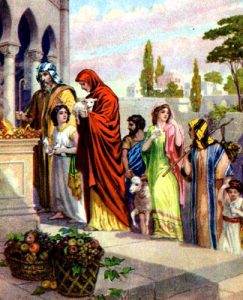When the Book of Deuteronomy speaks about the ceremony of the first fruits, there is brief record of the history of Israel with emphasis on the arrival of the Israelites to Egypt:
“And you shall make response before the LORD your God, ‘A wandering Aramean was my father. And he went down into Egypt and sojourned there, few in number, and there he became a nation, great, mighty, and populous.” (Deuteronomy 26:5)
So how is the biblical concept of the first fruits related to this historical review and why does the Hebrew Bible open the historical story of the Israelites in Egypt with the following words ‘a wandering Aramean was my father?’
According to ONE of the Jewish Bible interpretations, the ‘Aramean’ who is mentioned here was in fact Laban – aka in the Jewish tradition as ‘Laban the Aramean.’ This interpretation is based on the fact that in the original Hebrew the phrase ‘Arami Oved Avi’ {ארמי אובד אבי}– which was translated as ‘a wandering Aramean was my father’ – has a unique Hebrew syntax which could also be understood as ‘the Aramean who made my father ‘missing’ or ‘lost.’
*In tomorrow’s post we will discuss more in detail the Hebrew syntax and different interpretations of this unique Hebrew phrase.
And in this case, it is clear we are talking about Laban, the biblical figure from the Book of Genesis, Jacob’s father-in-law. But what does the story of Laban have to do with the story of the Israelites in Egypt?
Here is the connection between the two – according to one very fascinating and VERY un-orthodox interpretation that I thought would be interesting for you to read here:

Well, as we all know Jacob was deceived by Laban, who promised him (Jacob) that if he would work for seven years, Jacob would then be able to marry Laban’s youngest daughter Rachel. But instead, Laban ‘replaced’ her with his older daughter, Leah.
As a result of that ‘switch,’ Rachel’s older son Joseph was not the oldest (firstborn) as he should have been IF Jacob was married to Rachel first – instead of Leah.
Now, all the story of the older brothers envying Joseph for his special treatment he received from his father Jacob and as a result selling him to the merchants who went to Egypt – could have been different. As you may recall, only last week we discussed about the inheritance rights of the first born (double than the others).
In other words, if Laban had NOT deceived Jacob, Joseph would have been the firstborn and so the special treatment he received from his father Jacob would be just (because he is entitled to that by law). Hence, the brothers would not treat Joseph as they treated him (selling him to the merchants who went to Egypt) and so the entire story with the Israelites in Egypt would not have happened in the first place!
And what is the connection between all of that and the first fruits? Well, the Hebrew word for ‘first fruits’ is ‘Bikurim’ {ביכורים} which comes from the Hebrew root B-Ch-R {ב-כ-ר} – which is the same root of the Hebrew word for ‘firstborn’ which is ‘Becho’r’ {בכור}…
